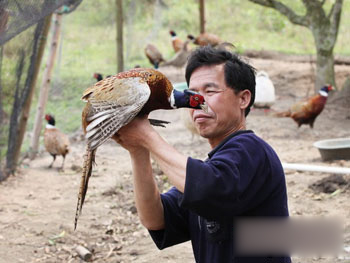800 li Dongting reed light paper more and more losses
Original title: [my Yangtze River] the past life and present life of a Reed

The endless asparagus on Huzhou (photo by Pan Jian, reporter of CCTV)
Reporter Jiang Wenjing and Reed contractor Gong Lijun came to Huzhou full of asparagus (photo by Pan Jian, reporter of CCTV)
According to China Voice News, "looking at the landscape of Dongting is like holding a green snail on a silver plate." In the Tang and Song poems, the eight hundred miles of Dongting is vast and beautiful. Dongting Lake is a rich "land of fish and rice". Because of its indispensable ecological regulation and storage function, Dongting Lake is called "the kidney of the Yangtze River".
A few years ago, in the course of industrial development, Dongting Lake was seriously "injured"-the asparagus growing on the vast lake and continent attracted the paper industry, brought economic benefits, brought black and turbid industrial wastewater, polluted the lake and polluted the Yangtze River. In recent years, people here have begun to reflect and change.
Reporter Zhang Xiaoxuan interviewed Li Jianzhi (photo by Pan Jian, reporter of CCTV)
Reporter Zhang Xiaoxuan interviewed the head of relevant departments of Yuanjiang Wetland Administration (photo by Pan Jian, reporter of CCTV)
After the beginning of spring in Dongting Lake, with continuous spring rain and Wanzi Lake wetland in South Dongting Lake, Li Jianzhi, president of the Yuanjiang City Nature Conservation Volunteer Association, jumped off the boat and bent down to pull an asparagus from the mud.
"Trichosanthes has covered the ground and the Reed has just sprouted, and this is the time when the puffer fish wants to rise along the tide." Li Jianzhi pulled up a plant similar to small bamboo shoots, which are seedlings of wild reeds in Dongting Lake. Rising water is a lake and falling water is a continent. In Yuanjiang City, Hunan Province, in the hinterland of Dongting Lake, there are 860000 mu of Huzhou. On more than half of the land, reeds grow year after year. Liu Tengfang, a villager of Lianhuaao in Wanzi Lake, has lived in Dongting Lake for more than 50 years. "you can see the green mountains and green waters in spring. In summer, the asparagus grows three or four meters, and the water rises. In autumn, the reeds grow Reed flowers. After the winter harvest, it will be gone. There is only dirt left, and that is white. "
Li Jianzhi looked through binoculars at the edge of the Reed wetland, hoping to find new migratory birds. (photo by Pan Jian, a reporter from CCTV)
Asparagus after initial processing (photo by Pan Jian, a reporter from CCTV)
Relying on the lake to eat the lake is the life support of the people of Dongting Lake area for thousands of years. In Yuanjiang, there are two pillar traditional industries, one is fishery, the other is Reed industry. In autumn, mature reeds are raw materials for papermaking. Around 2000, reeds can bring annual revenue of 200 million yuan to Yuanjiang.
Yuanjiang Lake is the largest Reed base south of the Yangtze River, with an annual output of more than 100,000 tons. At present, the asparagus on the lake and continent is like a green sea, while the reeds, which were cut down last autumn and are now withered and yellow, have been piled up on the roadside into "pallets" six or seven meters high, like a stranded boat. Gong Lijun, the Reed contractor, sighed, "the whole thing of Reed has only one use, that is, papermaking. Because of that paper mill, they have closed down. Up to now, the national environmental protection policy has been promulgated, and now there is zero tolerance." so it led to the closure of the paper mill. There are about 800,000 tons more than the Reed in the whole market. Oh, you must be in a hurry! In a market like ours, you cannot handle more than 10,000 tons, and you will have no place to go. Don't say that I lose 70 or 80 yuan per ton of reeds. In the past, the more reeds we shipped, the greater the profits. Later, after 2012, the more reeds, the more losses you will lose. "
Woodcutters from Guizhou and western Hunan used to come to Dongting Lake to cut reeds every winter, but now they are called the main force of pulling asparagus. (photo by Pan Jian, reporter of CCTN)
- Prev

The flesh of Huai'an "Golden Watermelon" is red, juicy and succulent.
The flesh of Huai'an "Golden Watermelon" is red, juicy and succulent.
- Next

College students return to their hometown to raise pheasant tree brand to grow, raise and travel as a whole.
College students return to their hometown to raise pheasant tree brand to grow, raise and travel as a whole.
Related
- A course of planting techniques and methods on how to grow carrots
- How to plant the latest tulips?
- Is it better to pick tea in the morning or in the afternoon? When is the best time for tea to be picked? what is the third or fifth tea?
- Launch Yuanxiao Happy combination Haocha + Tea Yuan healthy Taste
- Penghu Tourism "Fireworks 20 Parade with You"
- 2022 West Lake Happiness holds "Digital Revitalization Voucher" and draws iphone13 and laptop.
- Banqiao Fuzhou social houses are designed to change start-up combined with police elimination to create a safe and livable environment
- The convenient measure of "mechanical weeding" in Xinbei has been abused and the Agriculture Bureau has imposed heavy penalties on the illegal land consolidation.
- Changgeng University Joins Hands with Four Memory Factories to Rescue Memory Talent Shortage
- The list of Taiwan's top 100 MVP managers is listed by the Director-General of the Farmers' Association of Sanxia District.

